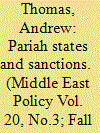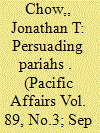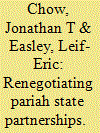| Srl | Item |
| 1 |
ID:
126049


|
|
|
| 2 |
ID:
149177


|
|
|
|
|
| Summary/Abstract |
Myanmar’s liberalizing reforms since late 2010 have effectively shed the country’s decades-long “pariah state” status. This article evaluates competing explanations for why Myanmar’s leaders made the strategic decision to pursue reform and opening. We examine whether the strategic decision was motivated by fears of sudden regime change, by socialization into the norms of the Association of Southeast Asian Nations (ASEAN), or by the geopolitics of overreliance on China. Drawing on newly available materials and recent field interviews in Myanmar, we demonstrate how difficult it is for international actors to persuade a pariah state through sanctions or engagement, given the pariah regime’s intense focus on maintaining power. However, reliance on a more powerful neighbour can reach a point where costs to national autonomy become unacceptable, motivating reforms for the sake of economic and diplomatic diversification.
|
|
|
|
|
|
|
|
|
|
|
|
|
|
|
|
| 3 |
ID:
168441


|
|
|
|
|
| Summary/Abstract |
Pariah status for violating international norms over decades increased Myanmar and North Korea’s dependence on China. Myanmar’s post-2010 reforms sought to reduce international sanctions and diversify diplomatic relations. North Korea pursued a diplomatic offensive after the 2018 Winter Olympics, but only after declaring itself a nuclear state. Why, despite both states’ politically unsustainable dependence on China, did Myanmar and North Korea pursue different strategies for renegotiating reliance? Unlike the Kim regime, Myanmar’s junta could step back from power while protecting its interests. Pro-democracy leader Aung San Suu Kyi was a credible signaler of reforms, providing Western governments political cover to reduce sanctions. Myanmar used liberalizing reforms to address internal threats, whereas North Korea utilizes external threats for regime legitimacy. The theoretical underpinnings and empirical trajectories of these distinctions–as well as Myanmar’s backsliding on human rights–explain why reducing reliance on China may prove more difficult than shedding pariah status.
|
|
|
|
|
|
|
|
|
|
|
|
|
|
|
|